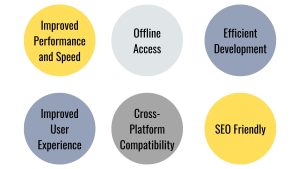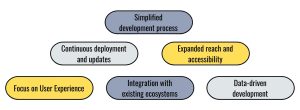content
E-Commerce Development
September 3, 2024
6 min read
Introduction
The e-commerce landscape and the technologies that support online shopping are rapidly evolving. Among these technologies, progressive web apps (PWA) have become a major innovation, offering both consumers and businesses a powerful alternative to traditional web and mobile apps. For software developers, PWAs represent not just a new tool in their arsenal, but a game-changer in how they approach e-commerce solutions.
What are Progressive Web Apps
Progressive Web Apps are web applications that combine the best features of websites and mobile apps. They are built using standard web technologies like HTML, CSS, and JavaScript, but offer an app-like experience, including offline access, push notifications, and the ability to be installed on a user’s device. PWAs are designed to work on any platform that uses a standards-compliant browser, making them incredibly versatile.
The adoption of PWAs in the e-commerce sector has been driven by the need to improve user experience and website performance. Traditional mobile apps offer a robust experience but have limitations such as the need for downloads, regular updates, and higher development costs. On the other hand, websites are more accessible but often lack the interaction features that apps provide. PWAs bridge this gap by offering the best of both worlds, and their impact on e-commerce is enormous.
Benefits of Progressive Web Apps for E-commerce

- Improved Performance and Speed: PWAs are designed to load quickly, even in areas with poor internet connectivity. This is critical for eCommerce, where page load times directly impact conversion rates. By caching content, PWAs can significantly reduce load times, resulting in a smoother shopping experience and reduced bounce rates.
- Improved User Experience: One of the standout features of PWAs is their ability to send push notifications, just like native mobile apps. For eCommerce businesses, this opens up new opportunities to engage with customers. Whether it’s notifying users about special promotions, abandoned carts, or new product arrivals, push notifications can drive traffic and increase sales.
- Offline Access: Unlike traditional websites, PWAs can work offline or in areas with poor internet connectivity. This is especially beneficial for users in areas with unstable internet connections. By allowing customers to browse products and even make purchases offline, eCommerce businesses can expand their reach and improve user satisfaction.
- Cross-Platform Compatibility: PWAs are platform-agnostic, meaning they work seamlessly across all devices and operating systems. For developers, this means that a single codebase can be used to create an app that runs on desktop, mobile, and tablet. This not only reduces development time and costs, but also ensures a consistent user experience across all platforms.
- Efficient Development: Developing a native app for multiple platforms (iOS, Android, Windows) can be expensive and time-consuming. However, PWAs eliminate the need for separate versions of the app since they run directly from the browser. This can result in significant cost savings for eCommerce businesses, especially those on a budget.
- SEO Friendly: Since PWAs are essentially websites, they can be indexed by search engines, unlike traditional mobile apps. This makes them more visible and allows eCommerce businesses to leverage their existing SEO strategies. Better visibility in search results can lead to increased traffic and higher sales.
How Progressive Web Apps Are Revolutionising E-commerce Development
For software developers, PWAs represent a paradigm shift in how e-commerce solutions are built and maintained. Here’s how PWAs are changing the game.

- Simplified development process: PWA development requires knowledge of web technologies like HTML, CSS, and JavaScript that are familiar to most developers. This reduces the learning curve and allows for faster development cycles. Additionally, the ability to reuse code across platforms simplifies the development process, allowing developers to focus on improving functionality and user experience.
- Continuous deployment and updates: Unlike native apps that require users to manually download updates, PWAs can be updated automatically. Developers can instantly deploy new features and fixes, ensuring that users always have access to the latest version without any disruptions. This continuous deployment model is especially useful for e-commerce businesses that need to respond quickly to market changes or user feedback.
- Expanded reach and accessibility: PWAs work on any device with a modern browser, making them accessible to a wider audience. For developers, this means that the apps they create can reach users across multiple platforms without having to develop for a specific platform. This expanded reach is especially important for e-commerce companies that target a global audience.
- Focus on User Experience (UX): With PWAs, developers can create highly interactive and responsive user interfaces that rival those of native apps. Features like smooth animations, offline functionality, and fast load times contribute to a superior user experience. By prioritising UX, developers can create e-commerce platforms that not only attract users but also keep them engaged, leading to higher conversion rates.
- Integration with existing ecosystems: PWAs can be integrated with existing web ecosystems, allowing e-commerce companies to leverage their current infrastructure. For example, a PWA can be built on top of an existing website, reducing the need for a complete redesign. This integration capability allows for a more gradual and cost-effective transition to PWA technology.
- Data-driven development: PWAs provide valuable insights into user behaviour through analytics and tracking. Developers can use this data to improve the app and make informed decisions about future updates. This data-driven approach ensures that the PWA continues to meet the needs of its users, leading to sustainable engagement and growth.
Case Studies: Progressive Web Apps in Action
Several e-commerce giants have already adopted PWAs and seen remarkable results:
- AliExpress: The global e-commerce platform saw a 104% increase in conversion rates for new users after switching to a PWA. The PWA also led to a 74% increase in time spent per session and a 2x increase in pages visited per session.
- Flipkart: India’s leading e-commerce platform launched its PWA, Flipkart Lite, which led to a 70% increase in conversion rates and a 40% increase in re-engagement among users.
- Alibaba: PWA for Alibaba, one of the world’s largest e-commerce companies, led to a 76% increase in conversion rates across all browsers and a 14% increase in monthly active users on iOS devices.
These case studies highlight the tangible benefits of PWAs and demonstrate their potential to transform the e-commerce space.
Conclusion
Progressive Web Apps are more than just a trend; they are the future of eCommerce. For software developers, using PWAs means staying ahead of the curve and delivering innovative solutions that meet the changing needs of both businesses and consumers. With their ability to improve productivity, increase engagement, and reduce costs, PWAs are poised to become the standard in eCommerce development.
If you have any questions or an idea for a project, contact us via sales@instandart.com or fill out the form on the main page of the site to discuss. We are always ready to help!
